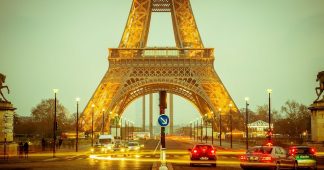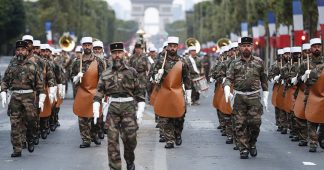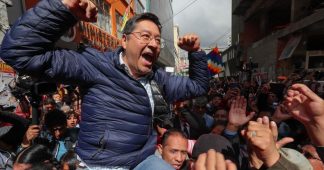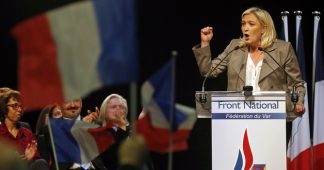By Pauline Graulle
Mar 1st, 2021
Photo:Osbornb via Flickr /CC BY 2.0
Will 2021 be a year full of twists and surprises? Many on the left are hoping for a small miracle, given the desperate political landscape emerging ahead of the presidential election. “We all have the distinct feeling that the New Year is going to see disastrous polls that will cause everyone’s morale to plummet,” a former Socialist MP predicted grimly just before Christmas.
He was not wrong. On 25 January, a poll by Harris Interactive on voting intentions in the presidential election put Jean-Luc Mélenchon around 10%, the Socialist Anne Hidalgo at 6 or 7%, with Green candidate Yannick Jadot hovering between 7 and 10%. In other words, with two or even three candidates, making it through to the second round of the presidential election currently seems like mission impossible for the left.
“2022: more candidates than voters on the left soon”
Paradoxically, however, and despite the left as a whole polling at around 25%, the number of presidential contenders has steadily increased in recent months. After Jean-Luc Mélenchon officially announced his candidacy in November, Anne Hidalgo is now openly admitting that she is “getting ready” and Yannick Jadot has just launched his own platform 2022 : l’écologie !. In addition to these three putative candidates, another arrival in the game is the former Socialist Arnaud Montebourg, who wants to gather support by striking a patriotic chord. Then there is Fabien Roussel, National Secretary of the French Communist Party (PCF), who has not ruled out breaking away from Jean-Luc Mélenchon (whom the party backed in 2012 and again in 2017) and standing for his own party in the presidential election.
This profusion of candidates, far from coming across as a sign of democratic vitality, was quickly perceived as yet another symptom of a rudderless left. “2022: more candidates than voters on the left soon”, the left-leaning daily Libération wryly observed on 11 January. And as if to admit that the presidential election is looking like an increasingly tall order, the parties’ senior officials have been talking a lot about the legislative elections of late…
Will 2022 be a year of reckoning for the left? The closer the election gets, the more the obstacles piling up on the path appear difficult to surmount. It must be said that the pandemic has only exacerbated the structural weaknesses of a left that has struggled, since François Hollande’s five-year term as president, to articulate an alternative vision. For the time being, the virus is preventing not only the prospect of unleashing a large social movement but also the emergence of a political leadership capable of inspiring a strong following, and also the development of a common doctrine to pit against President Emmanuel Macron and the far right.
Indeed, how can one make a dissenting voice heard when, for the past year, COVID-19 has been devouring the headspace of a society reeling from hundreds of deaths every day? Admittedly, despite public health orders to stay at home, the past year has seen protests against the global security law, racism and police violence, and Philippe Martinez, General Secretary of the General Confederation of Labour (CGT), is even promising a resurgence in protests in the first three months of 2021. Nevertheless, for the moment and for at least the next few months, the epidemic is thwarting any attempt to structure the anger (or hope) that could serve as a launch pad for an environmental and social alternative.
The spring municipal elections, which were fairly successful for the left, especially for the Greens, who won seven of France’s forty largest cities, were to be a key steppingstone on the way to the presidential election. But once again, as lockdown followed lockdown, the sense of renewal that emerged from the elections failed to crystallise around a movement or an identifiable figure.
A fresh – and final – attempt will be made with this year’s departmental and regional elections, in which the Greens hope to take at least one region (possibly New Aquitaine, which returned a Green mayor for Bordeaux in the municipal elections), while the Socialist Party (PS) aims to hold onto Occitania and Brittany, and a number of unity lists (not including the Greens) hope to do well in the Grand East and the North. Still, the divisions exposed in the first round, between Greens, Socialists and La France Insoumise, are a significant factor at play (especially in Île-de-France, where the three lists make a defeat of the Republican President of the Regional Council, Valérie Pécresse, unlikely). And the far right, currently waiting patiently in ambush, could spring a surprise in two or three regions.
One other factor to note is that the postponement of these regional and departmental elections from March to June of this year has forced the Greens to delay their primary until September, and with it the possible changes that it could entail in this part of the political field.
The public health crisis: a positive test?
A lacklustre and inaudible left, prevented by the public health situation from embarking on a much-needed restructuring in the post-Hollande era – this is one way of looking at it. In theory, however, and despite the general context of political glaciation, the pandemic could also prove to be a blessing in disguise for the opposition. Following the lies about masks and the shilly-shallying around testing, the third act of this saga – vaccines – has turned into a political quagmire for the government. The chaotic start to the mass vaccination programme is already looking like a resounding defeat for Emmanuel Macron, and the government led by Prime Minister Jean Castex now seems incapable of avoiding the current stop-and-go strategy, with its colossal collateral damage to the economy.
However, to press home their advantage, opposition players have to succeed in offering an alternative with substance. This means not only convincing people that COVID-19 is a monstrous creature spawned by a capitalist system that destroys ecosystems, but also putting forward another credible model for society, one that can be implemented quickly and is capable of addressing the deep crisis facing public services, which decades of budget choices have brought to a state of dereliction – starting with hospitals, which have shown both their efficiency and their underfunding during the coronavirus crisis.
On the societal level, Emmanuel Macron’s rightward tack over the past year could also present some prospects for a left-wing environmental offer. Even if the president tries to realign his position during the campaign by moving to the left, his backtracking on environmental issues (watering down the Climate Convention measures, rowing back from the ban on glyphosate, etc.); his far-right discourse on the Republic and security (laws on separatism and global security); and the stifling of all social protest (first the yellow vests, then opponents of pension reform and most recently protesters against the global security law) will not be forgotten. The same can be said of the debate on 11 February between Gérald Darmanin and Marine Le Pen, in which the interior minister’s posturing made him appear even more Islamophobic than the Rassemblement national (National Rally) candidate herself – quite a feat.
But will the left be able to capitalise on these shortcomings and use this period of disruption as a springboard for the months ahead? They would also need to unite – and at record speed – around a common roadmap and a single candidate capable of representing them. This is something that a number of civil society groups, organised or otherwise, have been demanding through petitions (such as the appel des 1000 launched in October), well aware that unity, while not enough by itself, will nonetheless be necessary.
So far, though, all the (feeble) attempts at joining forces have failed, one after the other. The idea of holding joint summer schools for left and green parties last August was briefly mooted, in the wake of the municipal elections, but has since fizzled out. Then the hopes raised by the Marseille Spring – a coalition of Greens, Socialists, Communists and La France Insoumise that won the municipal elections in Marseille – were dashed when the unconventional Green Mayor Michèle Rubirola resigned and was replaced by her number two, Socialist apparatchik Benoît Payan – a blow to those who prided themselves on renewing political practices.
On top of this, the ideological divisions that were erased for a time by the coronavirus crisis – during the first lockdown, the Socialists, La France Insoumise and the Greens were united in calling for the return of the solidarity tax on wealth, ecological planning, the scrapping of the pension reform and reshoring – have re-emerged starkly in recent months. For one thing, there remains a fundamental split on the relationship to capitalism, between a camp that rejects liberalism outright (La France Insoumise, the PCF and part of the Greens), and a social/environmental left more in favour of regulation of the market economy.
The recent murder of Samuel Paty, the teacher from the Paris suburb of Conflans-Sainte-Honorine beheaded by an Islamist terrorist, has further widened the gap. Stoking the polemical fire, Anne Hidalgo and PS First Secretary Olivier Faure took the opportunity, during this highly charged period, to accuse the Greens and La France Insoumise of being “ambivalent” in their relationship to the Republic, an accusation for which they provided no evidence. “At odds on economic issues, the left is indulging in a deep division on questions of secularism and Islam,” is how political scientist Rémi Lefebvre sums up the situation. “‘Racialisation’, ‘Islamophobia’ and ‘decolonialism’ are the words at the centre of this new discord. Attitudes to the ‘Republic’ have become a powerful marker of differentiation and fragmentation, further complicating the situation when it comes to rallying the left.”
So many questions to be answered in 2021
This doctrinal split is also a reflection of the personal and party-political strategies at work, with each player trying to advance their pawns for 2022 in the hope that the polls will eventually settle the question, and force everyone to get behind the favourite. Anne Hidalgo, the Socialist mayor of Paris, for example, is trying to embody a green and republican form of social democracy, capable of winning over both the metropolitan middle classes and disillusioned Macron voters from 2017. Meanwhile, Jean-Luc Mélenchon sees himself as the guardian of a truly ‘left’ left, and, with a huge economic crisis looming, is looking to attract the working-class vote (especially the yellow vests).
As for Yannick Jadot, who believes that green issues are in the process of replacing the social-democratic world view, he has to get through the ordeal of the Greens’ primary first. This is an open primary, which he wants to be as broadly inclusive as possible (as the most high-profile Green, he hopes that half a million people will turn out to vote, in order to really get things moving), and which he imagines could produce a contest between himself and several left-wing candidates, in particular Anne Hidalgo, whom he thinks he can beat “fair and square”. “There can only be one candidate between Mélenchon and Macron,” is now the mantra of the EELV MEP, a de facto admission that a union of the whole left is impossible.
After the regional and departmental elections that will see the PS, La France Insoumise and EELV standing against each other almost everywhere in the first round, will next autumn be the time for electoral pacts and cross-party unity? Will the polls carry sufficient legitimacy to ‘sift’ the various candidates? Will a unified programme command broad enough support to compete with the Macron/Le Pen duopoly? So many questions and so little time… though as the 2017 presidential election as well as the 2020 Covid crisis have shown us, surprises can sometimes arrive in a hurry.
About the author: After studying art and sociology, Pauline Graulle was a journalist for 10 years at the weekly news magazine Politis, where she was a social affairs and then political columnist. Since 2018 she’s been working for French website Mediapart, where she covers news about the French left.
Published at www.rosalux.eu











